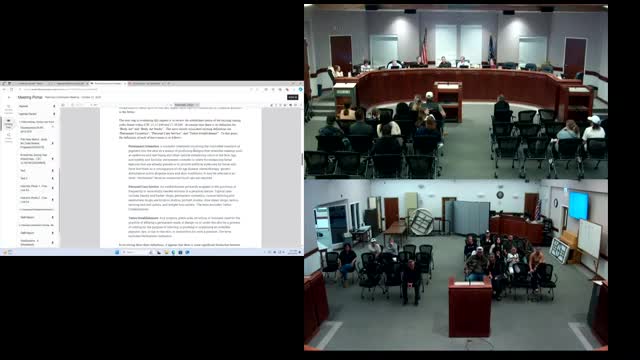Regulatory Confusion Sparks Debate Over Tattoo Parlor Ban
October 24, 2024 | Centerville City Council, Centerville, Davis County, Utah
This article was created by AI summarizing key points discussed. AI makes mistakes, so for full details and context, please refer to the video of the full meeting. Please report any errors so we can fix them. Report an error »

During a recent government meeting, a significant discussion emerged regarding the regulation of tattoo parlors, which currently face a full ban. One participant expressed astonishment at the existing prohibition, questioning the rationale behind it given the similarities in technology and techniques used in tattooing and other forms of body art.
The speaker highlighted the legal complexities involved in differentiating between various types of tattoos, such as fine line tattoos versus larger designs, and raised concerns about the lack of clear health, safety, and welfare justifications for such regulations. They argued that the current language surrounding the regulations is inadequate and called for a more precise definition that could guide the licensing and regulation of tattoo services.
Furthermore, the participant emphasized the need to move beyond societal stigmas associated with tattoos, particularly those influenced by religious beliefs, suggesting that these biases should not dictate regulatory decisions. They concluded by advocating for a reevaluation of the ban on tattoo parlors, indicating that the existing framework does not align with the pluralistic values of society. The discussion underscores a growing recognition of the need for updated regulations that reflect contemporary views on body art.
The speaker highlighted the legal complexities involved in differentiating between various types of tattoos, such as fine line tattoos versus larger designs, and raised concerns about the lack of clear health, safety, and welfare justifications for such regulations. They argued that the current language surrounding the regulations is inadequate and called for a more precise definition that could guide the licensing and regulation of tattoo services.
Furthermore, the participant emphasized the need to move beyond societal stigmas associated with tattoos, particularly those influenced by religious beliefs, suggesting that these biases should not dictate regulatory decisions. They concluded by advocating for a reevaluation of the ban on tattoo parlors, indicating that the existing framework does not align with the pluralistic values of society. The discussion underscores a growing recognition of the need for updated regulations that reflect contemporary views on body art.
View the Full Meeting & All Its Details
This article offers just a summary. Unlock complete video, transcripts, and insights as a Founder Member.
✓
Watch full, unedited meeting videos
✓
Search every word spoken in unlimited transcripts
✓
AI summaries & real-time alerts (all government levels)
✓
Permanent access to expanding government content
30-day money-back guarantee

